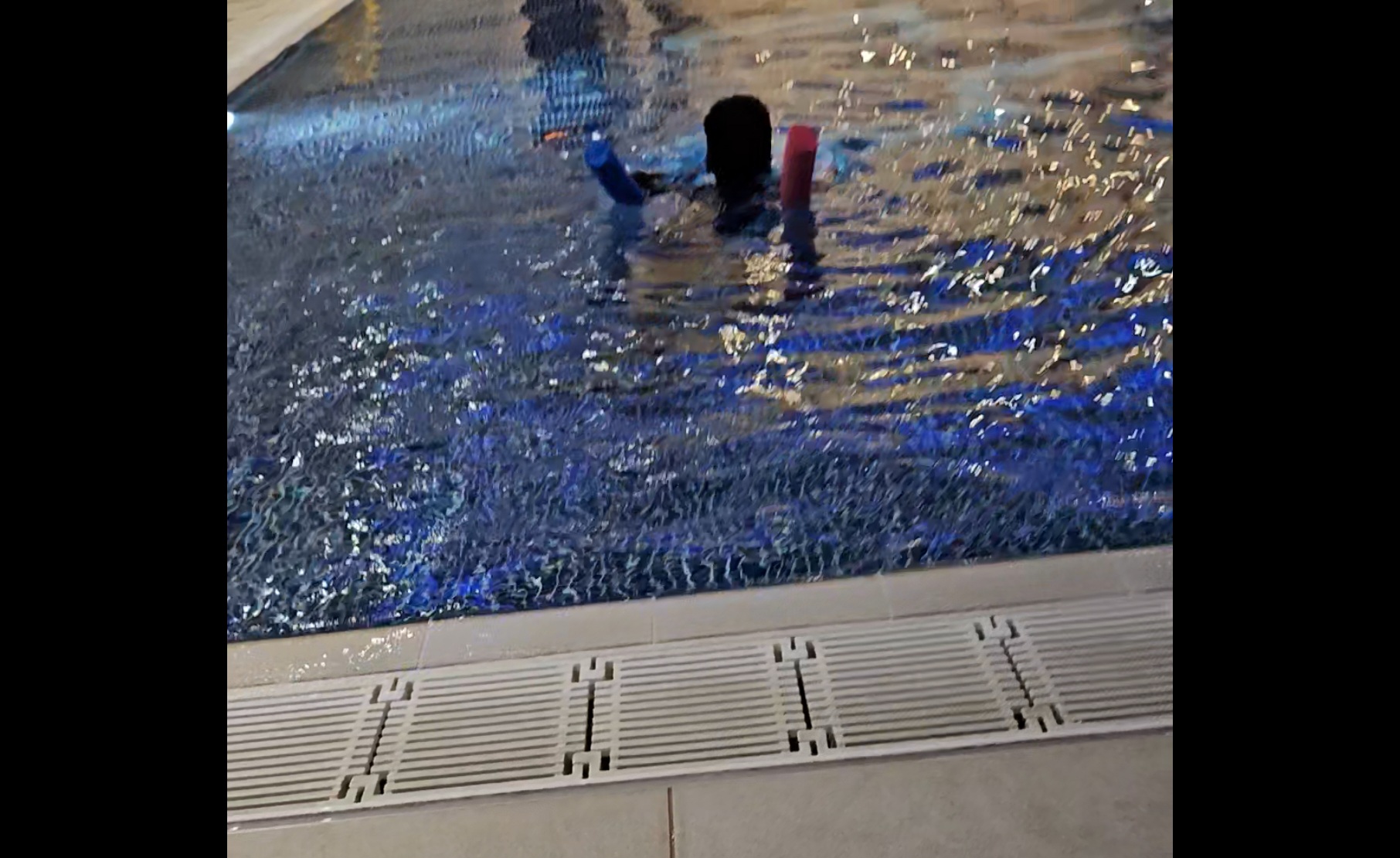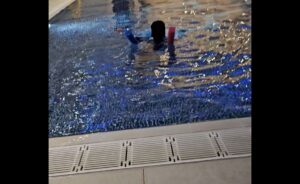
Every parent wants their child to have a splashing good time, but did you know that swimming can be more than just fun? It’s a golden ticket to a world of benefits, both in and out of the water.
It offers a unique combination of physical, emotional, and cognitive growth that is rarely matched by other childhood activities. During childhood, there’s a magical window of opportunity when skills are soaked up like sponges.
Swimming is one of those skills that’s easier to learn when young, and this magical phase is the perfect time to introduce your child to the water. Just imagine your little one gliding through the water, feeling confident and capable. It’s like watching a tiny superhero in action, harnessing the power of the water and themselves. Early exposure to such environments can boost a child’s adaptability and resilience in many areas of life.
But swimming isn’t just about fun and activity. It’s a fantastic way to build confidence, coordination, and life-saving skills in a child. These skills don’t just stay in the pool but carry over into a child’s daily life, promoting their overall development.
And speaking of confidence, let me tell you about my son, Golden, and how his journey into the world of swimming has opened up new doors for him.
So yesterday, being Thursday, was Golden’s first-time swimming all by himself in the pool. A week before, while myself and him were busy enjoying ourselves with water splashes and racing in the pool, the instructor who has been with him since he was 1-year-old came very close to me and said she’d like Golden to move up to the next class due to his high level of competence.
She mentioned that he wouldn’t need me to be in the pool with him anymore and was happy for him to start next week, though it was up to me whenever I was ready. This moment marked a huge milestone for both of us, and it was both exciting and nerve-wracking.
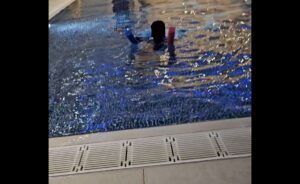
When she mentioned this, my heart raced for a few seconds. I wasn’t sure how I was feeling, there was a mix of emotions, including pride and anxiety. This is the same child I didn’t want to swim. The same child I was scared of letting go in the pool. The same child I held so close, always keeping an eye on him to ensure nothing happened to him. The thought of him swimming independently was hard to digest, yet thrilling. Even though I was scared of water, due to my intentional parenting and understanding of the benefits of swimming, I summoned the courage to give it a try.
The truth is, the more I found myself in the pool, the more I gained confidence, and the more I gradually let go of him, allowing him to explore the water until we got to this stage of moving up. It’s amazing how, as parents, we evolve along with our children in these moments of growth.
I remember someone telling me, “Why is he starting so early? You’ll waste your money because he won’t understand what’s being taught.” It’s funny how people can doubt a child’s ability to learn at a young age. I vividly remember replying that I wanted him to start early because, for me, the earlier, the better.
Children are like sponges, and Golden was no exception. I knew that starting him early would allow him to absorb more and adapt faster to the water. What many people fail to realize is that early exposure helps build a foundation that lasts a lifetime.
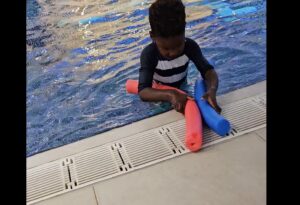
Now he’s 3-years-old, the difference between him and his mates whose parents thought it was too early is clear. While their parents might feel this is the right time to start, my son has already gained so much confidence. He can go underwater, follow instructions, sing along to songs, listen, pay attention, and move his body in ways that show he’s mastering new skills.
It’s a transformation that is hard to ignore. Meanwhile, other children will just be starting from scratch. While they’re learning basic skills, my son will be learning more advanced ones and gaining even more confidence. It’s truly rewarding to see how far he’s come, and it shows the immense value of starting early.
This journey highlights the power of starting early. And trust me, the earlier your child dives into learning, the better. There’s no substitute for the confidence and mastery that early learning provides. In fact, studies have shown that children who are introduced to skills such as swimming at a young age tend to be more adaptable and excel in other areas, including social interactions and academics.
Another important thing to note is that there are “windows of opportunity” for every child. This is the period when children learn certain skills and information easily and quickly. Once this window closes, it becomes more difficult for a child to learn the same skills or information.
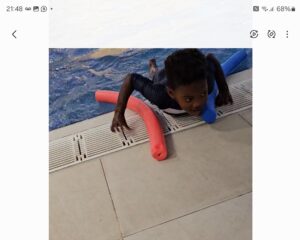
Even when they try, it’s more about memorization and repetition rather than natural learning. These windows of opportunity are also known as sensitive periods. And trust me, taking advantage of these sensitive periods is crucial for your child’s long-term development and happiness.
What happens if you register your child too late, and they miss this sensitive period?
Will you blame the child for struggling to learn water skills or for not having the confidence to get in the water?
The reality is, it’s not the child’s fault if they find themselves struggling later on. According to Mary Ellen Maunz, “A sensitive period is a burning fire of interest in something, during which a child acquires a new specific skill.” Failing to act during this time can lead to missed opportunities, making learning harder down the road.
Another point to consider is that your child might feel intimidated by other children who started swimming earlier. If their need for competence hasn’t been met, they’re likely to give up and show behaviors like, “I don’t want to swim anymore,” or “I hate swimming,” crying during lessons, or even refusing to participate altogether, they might distract others, play instead of learning, or refuse to follow instructions. All these behaviors stem from a lack of motivation, which can often be traced back to missing out on early exposure to skills like swimming.

In addition, your child might grow up regretting that they weren’t involved in extracurricular activities like swimming. Believe me, this kind of regret is always very painful and can even lead to trauma, because trauma includes the things a child was supposed to have but didn’t.
Imagine reaching adulthood and realizing that an important life skill like swimming wasn’t developed early enough. No parent wants that for their child, right? The opportunity to learn and grow should never be missed, especially in formative years.
Now let’s see why your child needs swimming
Swimming England recently reported that children between the ages of seven and eleven years old are unable to swim a minimum of 25 meters on their own. This means over one million children in the UK are not safe in and around water and are at risk of drowning. This is a staggering statistic that highlights the importance of teaching children to swim from a young age.
In fact, the International Olympic Committee has also emphasized the importance of swimming as a life skill. Olympic athletes often start their training at an early age, not only for competition but also because swimming builds core strength, coordination, and endurance from a young age.
According to Olympic research, early exposure to swimming can significantly reduce the risk of drowning and other water-related accidents, making it not just a sport but a critical survival skill for children. Programs inspired by Olympic athletes focus on encouraging children to start swimming early to cultivate a love for the water and improve safety around it. Learning to swim isn’t just about excelling in sports but about survival and safety for life.
- Swimming is a crucial life skill. Thousands of deaths occur each year worldwide due to drowning.
This is why a child needs to learn how to swim, to be safe in and around water. When your child knows how to swim, they’ll feel confident and strong and be less likely to take dangerous risks. This foundational skill can one day save their life or the life of someone else.

2 .Swimming is one of the best exercises. It’s a full-body workout and a great cardiovascular exercise, engaging multiple body systems. For children looking to lose weight, it’s also an excellent form of exercise. The added bonus is that swimming is low impact, meaning it’s gentle on growing joints and muscles while still providing a rigorous workout.

3. Swimming teaches children teamwork. Children love being part of a team, and it teaches them the importance of emotional support and working towards a common goal. This sense of community and collaboration is essential for their emotional development and helps them build long- lasting friendships.

4. Swimming engages the mind. It helps children stay focused in the classroom and boosts academic performance. The mental discipline and concentration required to master swimming strokes translates into better cognitive skills in school. Plus, the sense of achievement they feel after learning a new swimming technique builds their self-esteem.

5. Above all, swimming is fun and exciting. My children always look forward to their swimming days, not just because it’s fun, but because they get to see their friends. You should see how they hug each other, chat endlessly, and spend time together in the showers afterward.
To be honest, it’s probably their favorite day of the week! Swimming boosts their confidence, strengthens social bonds, and equips them to face life’s challenges. It’s both fun and rewarding, giving children something to look forward to while reaping physical and emotional benefits.

Dear parents, I understand that some children, even if registered for swimming lessons from an early age, might still cry and refuse to go into the pool because they simply don’t enjoy it. they just don’t like it and there’s nothing you can do to change that fact. The most important thing is having the understanding that you can’t force a child to do what they don’t want to. I’ve seen 3-month-old babies cry the moment they’re in the pool and quiet as soon as they’re out. But that shouldn’t stop you from giving it a try!
Introducing them to the pool still offers invaluable exposure and experiences that will benefit them as they grow. Life can be challenging in terms of cost, availability, and time, but remember, intentional parenting involves sacrifice. Whether it’s time, money, or effort, providing your child with opportunities is part of giving them a parenting advantage. And swimming is one of those advantages.


